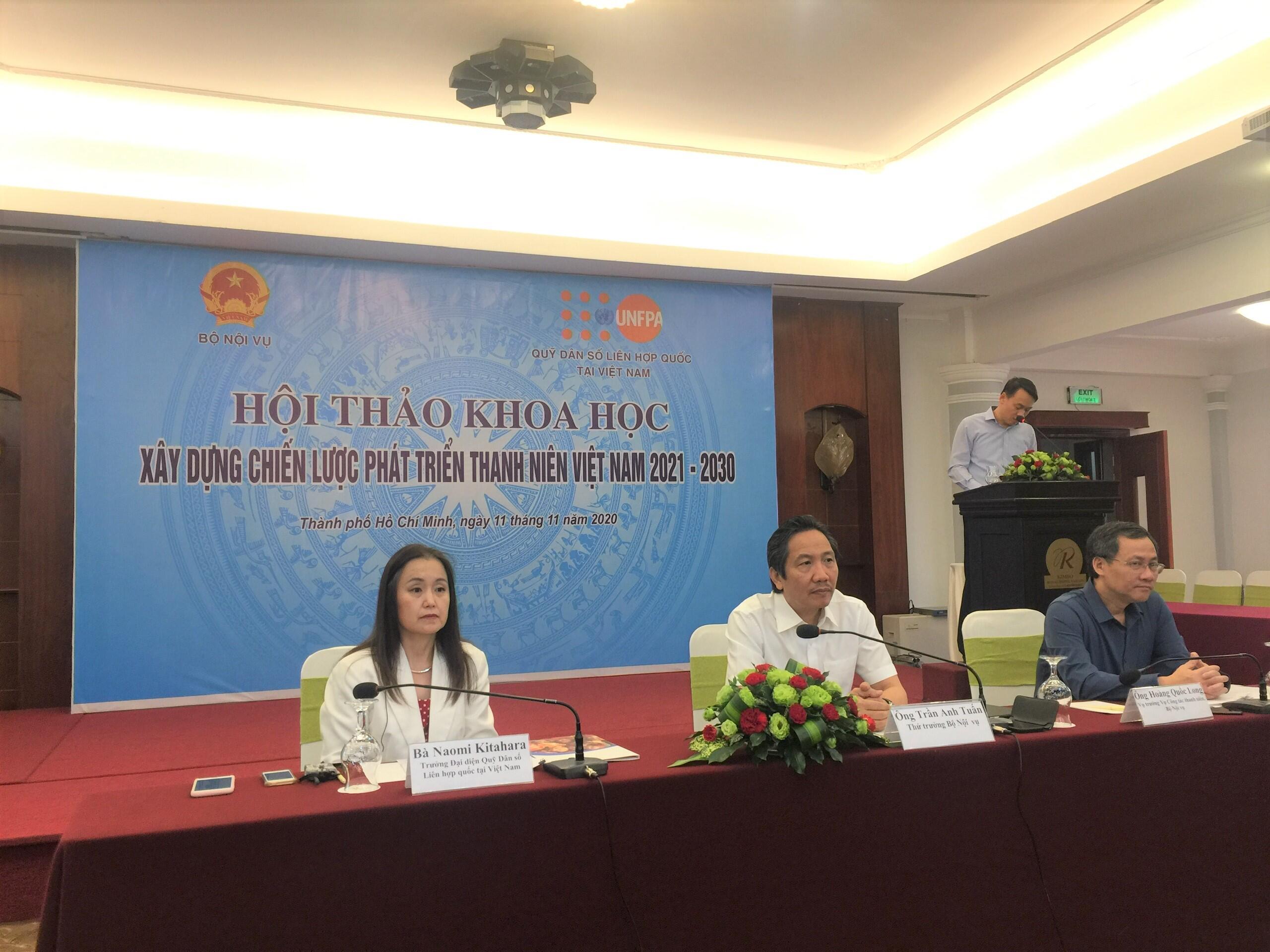Excellency Mr. Tran Anh Tuan, Vice Minister of Home Affairs;
Representatives from Provincial People’s Committees of Central and Southern provinces;
Representatives from Provincial Departments of Home Affairs;
Representatives of the Youth Union,
Experts, researchers,
Representatives of the Youth Advisory group and young people;
Good morning,
It is my pleasure to be here today in Ho Chi Minh City for the Consultation Workshop for the Viet Nam National Strategy on Youth Development for the period 2021-2030.
Under the leadership of Excellency Mr. Tran Anh Tuan, Vice Minister of Home Affairs, the revised and approved Youth Law was disseminated a few months ago to the representatives of the Communist Party Office, the Government Office, Line Ministries, and all 63 provinces and cities of Viet Nam. We highly appreciate strong political will and commitment to youth affairs of the Communist Party and the Government of Viet Nam at all levels.
I would like to thank the Ministry of Home Affairs for taking a lead in the development of the National Youth Development Strategy 2021-2030. We hope that this Strategy will provide a firm framework and appropriate approaches for all sectors, ministries and local authorities to jointly take an action and implement the Youth Law 2020 in addressing young people's rights and needs, including their sexual and reproductive health needs, and contributing to achieving Viet Nam’s socio-economic development and the Sustainable Development Goals (SDGs) by 2030.
Dear participants,
In 2018, the UN Secretary General approved the UN Strategy on Youth, which reiterates the UN’s strong commitment to support young people below the age of 30 years. To operationalize it, UNFPA developed its global strategy for youth called “My Body, My Life, My World”. It puts young people - their talents, hopes, perspectives and unique needs - at the very center of sustainable development. The Strategy outlines a set of key programming principles that are applied to all the UNFPA’s work on adolescent and youth, and offers a new mentality and mode of programme delivery with and for young people.
Viet Nam is in the phase of demographic transition, in which the “population dividend” can be tapped into for national development. In the 2019 Census, Viet Nam recorded the highest proportion of young people in Viet Nam’s history with 20.4 million young people aged 10 – 24, which accounts for 21% of the population. The demographic window of opportunity, which was first identified in 2007 and is projected to last until 2041, presents Viet Nam with a unique opportunity for developing a generation of drivers of economic, social, and environmental progress.
In this context, I would like to highlight a few issues, which can be taken into consideration today to develop the new National Youth Development Strategy.
First, Youth is the center: The Strategy should put young people at the center of the national sustainable development. It embraces all adolescents and youth and celebrates their rich diversity. There are vulnerable young people such as girls, youth with disabilities, ethnic minority youth, LGBT youth, and young migrant workers, and we must recognize their special needs to leave no one behind from Viet Nam’s development agenda.
Second, all adolescents and youth should make informed choices: The Strategy should ensure access of all adolescents and youth, especially girls, to comprehensive and age-responsive information, education and adolescent-friendly services to be able to make free and informed decisions and choices about their life particularly with regard to sexual and reproductive health. It is important that the new Strategy helps them to protect themselves from unintended pregnancies, gender-based violence and harmful practices, and sexually transmitted infections including HIV/AIDS, in order to facilitate a safe transition into adulthood. Sustainable development can only be achieved by investing in adolescents and youth to guarantee their rights and choices.
Third, youth participation: Evidence shows that working in partnership with young people is an essential component of any successful national strategies for young people. In the Vietnamese context, we recommend the new Youth Strategy to provide substantial efforts and take concrete actions to create an enabling environment and dynamic mechanisms to allow youth participation. This includes the need to establish innovative platforms that encourage more young people, especially vulnerable youth groups, to participate in policy development, implementation and monitoring.
Last but not least: Partnerships: Apart from the central role to be played by the Government, the new Youth Development Strategy needs to make sure that all stakeholders, including youth-led and youth-serving organizations, the government agencies at all levels, community leaders, civil society, academia, the private sector and the media, play their essential roles and operate as One Team.
Let me assure you that the UN, and UNFPA in particular, is fully committed to continuing our support to the Government of Viet Nam and its partners in creating and sustaining the opportunities and rights for young people. All participants today have been involved, building on their unique and valuable perspectives, expertise and understanding of the issue at hand, and all, including young people, must be encouraged to enrich the discussion with their specific contributions.
We are looking forward to productive discussion today. I wish you all good health, happiness and success. Thank you.


